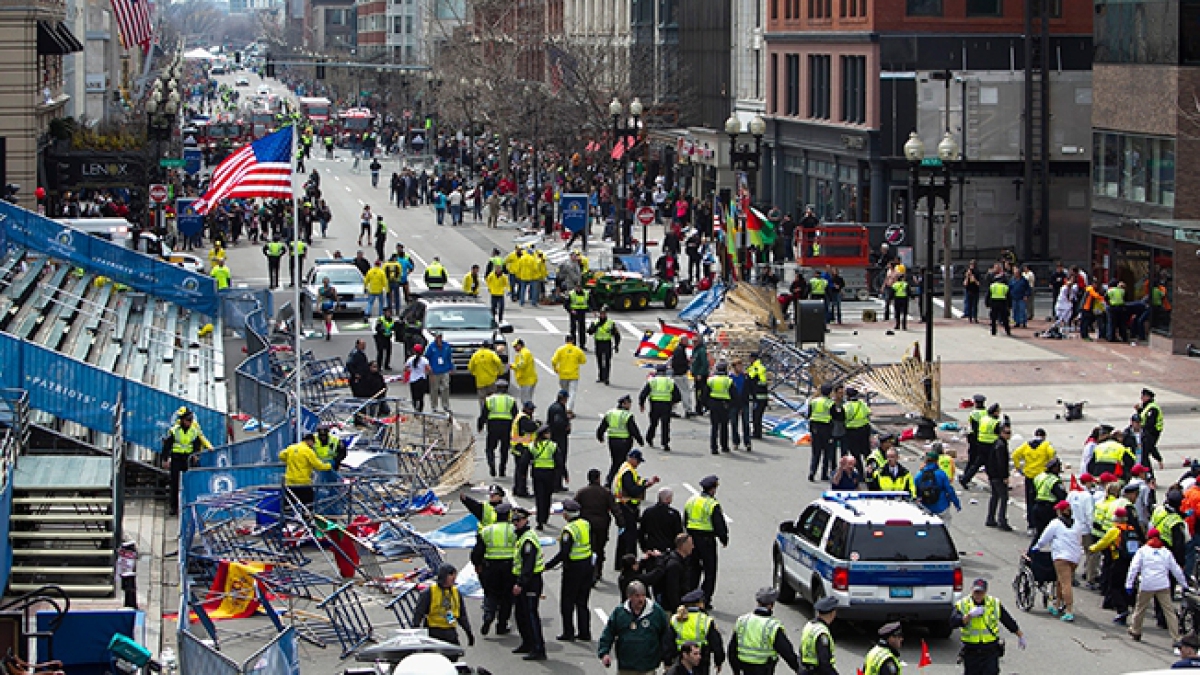Grief Without Borders

"She had a great sense of humor and freckles and red hair that brought her right to her Irish roots."
She was "a dream daughter."
I have a daughter, so maybe that's why these words cut so deep.
This was a dad's description of a young woman, Krystle Campbell, who was one of the three people killed in the Monday bombings at the Boston Marathon, with well over a hundred wounded, some critically. The bomb went off in the final stretch of the race - which had been dedicated to the victims of the tragedy in Newtown, Conn., four months earlier.
My God. Now another wound has opened in the social fabric. Another enormous question tears at our hearts. Once again we ask: Why?
Even if the police solve the riddle and catch the killers - and we learn the particulars of their agenda or their insanity - we will hardly be any closer to an answer. Beyond the question of why did they do it, a more insidious question lurks. Why does so little change in response to the violence that occurs both in shocking randomness in "safe" communities around the country and as an everyday fact of life in our poor and devastated neighborhoods?
As so many people have said in the last few days: Life is precious. No one ever qualifies that statement. Every life is a unique, invaluable, irreplaceable manifestation of human potential. Yet why is our awareness of this basic truth so fleeting? Why do we make grief hierarchical - some deaths matter more than others - and thereby diminish it immeasurably?
As Glenn Greenwald wrote shortly after the bombing: "But it was really hard not to find oneself wishing that just a fraction of that compassion and anger be devoted to attacks that the US perpetrates rather than suffers. These are exactly the kinds of horrific, civilian-slaughtering attacks that the US has been bringing to countries in the Muslim world over and over and over again for the last decade."
On the same day as the Boston Marathon bombing, a string of car bombs exploded across Iraq, killing 55 people and injuring at least 200, according to CBS News. The next day nine people were killed and 27 wounded when two more car bombs detonated in Aziziyah, a city about 35 miles south of Baghdad. This is "our" Iraq, the country we invaded, occupied for eight years and ultimately abandoned, leaving the shattered nation to fend for itself.
Also on Monday, the same day as the Marathon bombing, seven were killed and four more wounded when a roadside bomb went off in Afghanistan, in the southern province of Zabul.
Again, again, again. Our beautiful world erupts with spasms of violence; our loved ones die. Yet we cannot grieve with innocence. We also participate in the violence.
A few days earlier, a coalition of human rights groups sent a letter to Barack Obama demanding an end to the secrecy that surrounds U.S. drone strikes, according to the New York Times.
"By the count of the New America Foundation, a research group that tries to track targeted killing, the United States has carried out 422 strikes in Pakistan and Yemen, 373 of them since Mr. Obama took office in 2009, in addition to a handful in Somalia," the Times reported. "The foundation estimates the number of deaths resulting from the strikes to be between 2,426 and 3,969, of which about 10 percent were of civilians and nearly as many of which were identified as 'unknown.' An overwhelming majority of the strikes have been carried out by unmanned drone aircraft, though cruise missiles, fighter jets and helicopter gunships have also been used."
Will we ever reach a point where most Americans choose to absorb such data in the context of our own terrible violence? Will we ever reach a point where we feel the same urgency of grief for the victims of the violence that is a fact of life in the Middle East?
This is the first step, and it seems so obvious: open the borders of our grief.
Instead, of course, we declare the Boston tragedy an act of terror, which, as Greenwald noted, is code for "Muslims must have done it." And suddenly the walls go up, behind which grief turns to hatred and fear. We become hostages of our obsession with security and our world grows increasingly less human. And in a dehumanized world, we are so much less secure.
Two years ago, when Norway was shattered by a lunatic with an anti-immigrant agenda and 77 people were murdered, including 69 young people at a summer camp, the mayor of Oslo said the next day: "I don't think security can solve problems. We need to teach greater respect."
Some of us - maybe most of us - get it. This is the way the world must change: first, by recognizing that our common humanity doesn't stop at the border.
*****
Robert Koehler is an award-winning, Chicago-based journalist and nationally syndicated writer. His new book, Courage Grows Strong at the Wound (Xenos Press) is now available. Contact him at koehlercwgmail.com, visit his website at commonwonders.com or listen to him at Voices of Peace radio.
2013 TRIBUNE MEDIA SERVICES, INC.

















